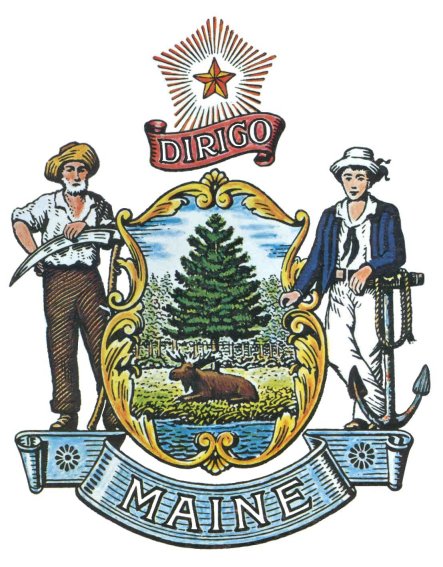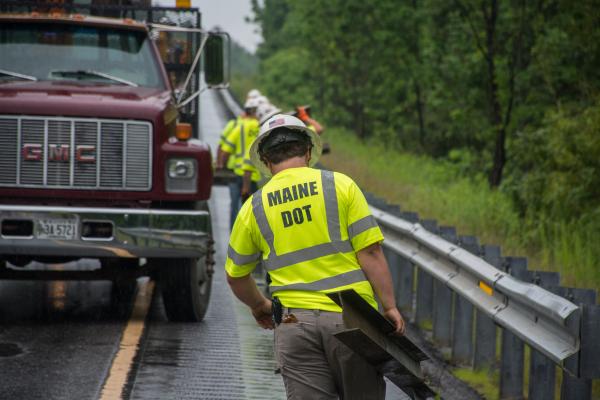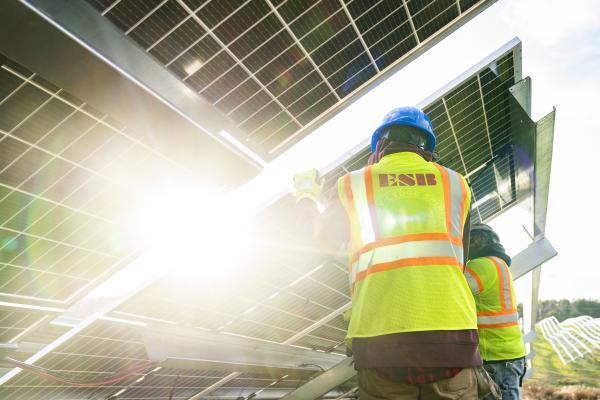 “This once-in-a-generation investment will help us fix our roads and bridges, expand high-speed broadband, improve access to clean drinking water, and build a cleaner, more sustainable transportation network – all while putting Maine people to work in good-paying jobs. I thank the President and Maine’s Congressional Delegation for their work to get it done.”
“This once-in-a-generation investment will help us fix our roads and bridges, expand high-speed broadband, improve access to clean drinking water, and build a cleaner, more sustainable transportation network – all while putting Maine people to work in good-paying jobs. I thank the President and Maine’s Congressional Delegation for their work to get it done.”
-- Governor Janet Mills
The Bipartisan Infrastructure Law (BIL), signed by President Joseph Biden with the support of Maine’s full Congressional delegation, offers a historic opportunity to invest in Maine’s roads and bridges, expand broadband and public transportation systems, improve climate resilience, build a clean energy future, ensure clean drinking water, and grow Maine's economy through sustained investment and good-paying jobs.
BIL Investment Categories
By executive order of Governor Mills, the State has established an Infrastructure Implementation Committee to coordinate the implementation of BIL initiatives among the State, cities, towns, tribal governments, and other entities in Maine. For more about each BIL category, visit the Categories page.

Transportation
BIL funding will support important investments in Maine’s transportation system to support economic opportunity and quality of life.
Coordinating Agencies: Maine Department of Transportation, Governor’s Energy Office, Governor’s Office of Policy Innovation and the Future, Department of Environmental Protection, Efficiency Maine, and Department of Economic and Community Development.

Resilience & Environmental Protection
Programs to strengthen the state's preparedness for storm events, flooding, and wildfires; to build resilience of transportation networks, drinking water and wastewater systems; to mitigate contaminants and pollution; and to improve natural capacity of watersheds and ecosystems.
Coordinating Agencies: Coordination of these investments is through a BIL Resilience Working Group, a cross-agency effort established to take advantage of BIL resilience opportunities which include over $50 billion for evacuation routes, coastal resilience, improving infrastructure resilience, or efforts to move infrastructure to nearby locations less impacted by extreme weather and natural disasters.

Energy Programs & Building Efficiency
Programs supporting improved energy efficiency in buildings and the expansion of affordable, clean energy generation and transmission networks.
Coordinating Agencies: Governor’s Energy Office, Maine Department of Transportation, Governor’s Office of Policy Innovation and the Future, Efficiency Maine, MaineHousing, and the Maine Public Utilities Commission.

Broadband & Technology
Programs to expand the interconnection and economic viability of Maine communities through improved, robust, affordable and universally available high speed internet (broadband) and secure information systems.
Coordinating Agencies: Department of Economic and Community Development, Maine Connectivity Authority, Department of Administrative and Financial Services, and Maine Department of Transportation.
BIL Projects Near You
With an estimated $2.5 billion available to Maine through both direct and competitive funds, the Mills Administration is committed to ensuring Maine people and communities receive the greatest possible benefit from BIL.
This dashboard contains data about many BIL programs, focusing primarily on those that have provided direct grants. In most cases, dollar values shown are the awards authorized by the program. Data will be updated it becomes available. For more about each category, visit the Categories page.
BIL Project Highlights
Resilience and Environmental Protection
On August 7, 2023, the Biden-Harris Administration announced it has awarded $200 million to 10 states and 14 tribal governments to upgrade culvert systems, as part of BIL's initiative for Drought and Climate Resiliency Projects. Maine will receive $35 million, the third-highest amount among the ten state awardees. See the full announcement of the awards here.
Transportation
On December 13, 2023, the U.S. Department of Transportation awarded $27.7 million in grants to MDOT to reconstruct two sections of US 1 near Frenchville through the Rural Surface Transportation Program. See the full list of awardees here.
Energy Programs and Building Efficiency
MaineDOT, Efficiency Maine, Governor’s Energy Office, Maine DEP, and the Governor’s Office of Policy Innovation and the Future have received Federal approval on a plan to invest in Maine's electric vehicle charging infrastructure (PDF) through National Electric Vehicle Infrastructure Deployment (NEVI) funds.
Broadband and Technology
The Maine Connectivity Authority will receive $272 million from the Broadband Equity, Access, and Deployment (BEAD) program. Read more about this program here.
Highlighted Funding Opportunities
The Mills Administration is committed to ensuring Maine people and communities receive the greatest possible benefit from BIL. This section contains BIL funding opportunities with the strongest potential for investment in Maine. Visit the Categories page for all active and upcoming BIL funding opportunities.
Transportation
RAISE Program: The RAISE program was established to provide grants to communities around the country to help carry out projects with significant local or regional impact. Applications open through Feb. 28, 2024. Find more information here.
Energy Programs and Building Efficiency
Distributed Energy Systems Demonstrations Program. A new competitive grant program to fund distributed energy systems (DES) that demonstrate successful technical and financial approaches to aggregate large amounts of distributed energy resources to support resilience and community benefits. Applications open through Apr. 15, 2024. Find more information here.
Broadband and Technology
Rural And Municipal Utility Advanced Cybersecurity Grant and Technical Assistance Program. New program of cooperative agreements, contracts, or grants to rural electric cooperatives, municipally owned electric utilities, other state-owned utilities, or small investor-owned utilities. Find more information here.
Resilience & Environmental Protection
Building Resilient Infrastructures and Communities Program. FEMA provides federal funds for the Building Resilient Infrastructures and Communities (BRIC) grant program to states, local communities, tribes, and territories for hazard mitigation activities. BRIC is a FEMA annual hazard mitigation program. For fiscal year 2023, FEMA will distribute up to $1 billion for the BRIC program. Interested communities should reach out to Heather Dumais - heather.dumais@maine.gov
BIL Resources
Information and guidance about BIL for interested parties in Maine.
Build.gov
Visit build.gov to view the latest federal information about BIL, state-level factsheets, and the technical assistance guides for communities.
Contact Us
Send us a question about BIL projects, funding opportunities, or implementation process using our online form.